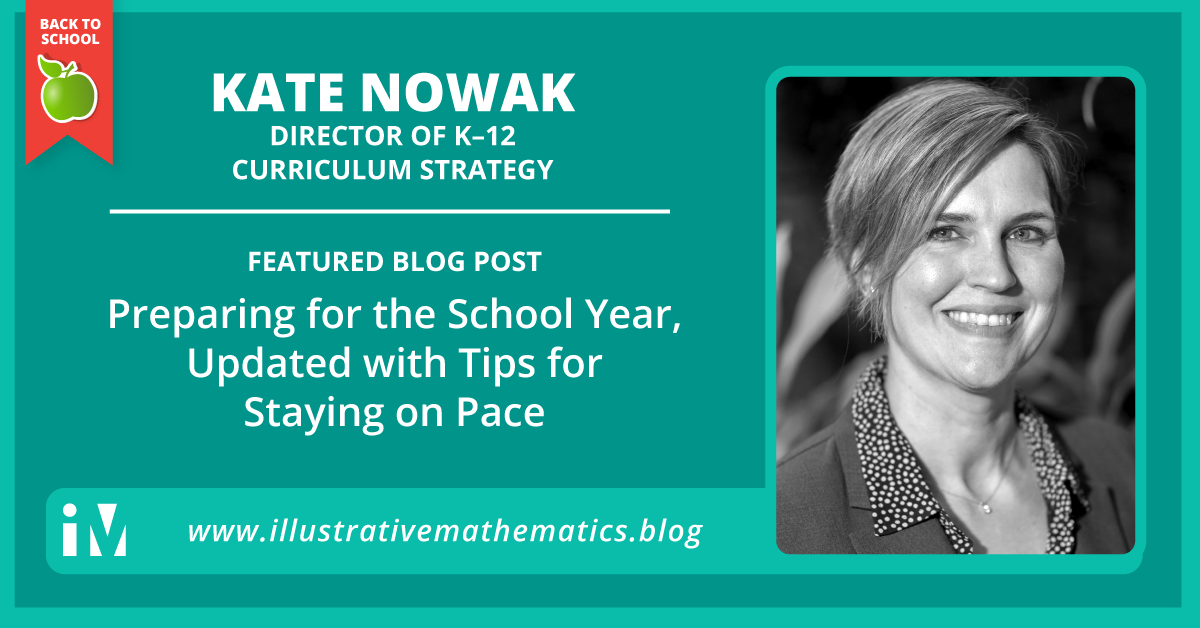Last year, we put together some reading to help people get started planning their year with IM 6–8. Now, we have another year’s worth of blog posts to choose from, plus a shiny, new high school curriculum! So once again, we’ve gathered some posts from IM’s blog with different purposes to help get your year off to a good start.
By Kate Nowak
Before we dive into the links, if you are new to the IM curriculum, here are some tips to help you stay on pace:
- Use the Check Your Readiness assessments to anticipate what background knowledge you do and don’t need to attend to. (You can avoid things like spending a whole day reviewing the Pythagorean Theorem only to realize that kids remember it from grade 8 and can use it just fine.) Each pre-assessment item includes a teacher narrative with specific suggestions for adding additional questions, highlighting particular content, or offering certain tools or supports.
- If it seems like all students didn’t quite get the point of a lesson or didn’t do very well on a cool-down, look ahead. It may be that students have many more opportunities to solidify their understanding of the idea, and are expected to use informal strategies and experience productive struggle at this point in the unit.
- It might be a good idea to set a PLC agenda item for, say, mid to late October to look at how far through the curriculum your team has gotten up until that point (rather than waiting until later in the year to realize there’s not enough time). If needed, make intentional decisions about what you’re not going to address this year. You can also discuss productive ways to pick up the pace, like . . .
- If you’re having trouble getting through lessons at a rate of one per day, there are other options besides slowing down. For example, are you spending 15 minutes going over homework? (How else can students evaluate and learn from their practice?) Is it taking 20 minutes to get through a 5-minute warm-up? (Seek out examples of how a math talk can be done well in 5–10 minutes, practice this with your team, and try some strategies like setting a timer.)
Okay, let’s see some links!
Looking for some guidance on getting started?
- Introducing IM 9–12 Math
- Extra Supports for Algebra 1: The Gateway Resources
- If your students are new to problem-based learning, check out this series of posts:
Need support for successful implementation of the curriculum?
- Building a Mathematical Classroom Community
- Planning Lessons for a Block Schedule
- Planning to Use Pre-Unit Assessments
- Planning for Meaningful Practice
- Building a Supportive Home/School Partnership
- Learning Goals and Learning Targets
Want to read some background stuff about curriculum design?
- What Is Problem-Based Instruction?
- How Do You Start the Year?
- Developing Conceptual Understanding and Procedural Fluency
- Designing Coherent Learning Experiences K–12
- Catalyzing Change in IM 9–12 Math
Want to learn more about the routines and lesson plan structures used to support teachers and students?
- What Is an Instructional Routine?
- The Power of Noticing and Wondering
- The 5 Practices in a Lesson Framework: Explicit Planning vs Explicit Teaching
- Info Gap Cards: The Hidden Gem
Interested in learning more about the math in the high school curriculum units?
- Proof in IM’s High School Geometry
- Truth and Consequences Revisited
- Rigor in Proofs
- Making Sense of Distance in the Coordinate Plane
- Making Peace with the Basics of Trigonometry
Interested in learning more about the math in the 6–8 curriculum units?
- Representing Subtraction of Signed Numbers: Can You Spot the Difference?
- Why is 3 – 5 = 3 + (-5)?
- What I Learned Today: Scale Drawings & Maps
- On Similar Triangles
- Truth and Consequences: Talking About Solving Equations
- What is the Time? It Depends . . .
- Why We Don’t Cross Multiply
